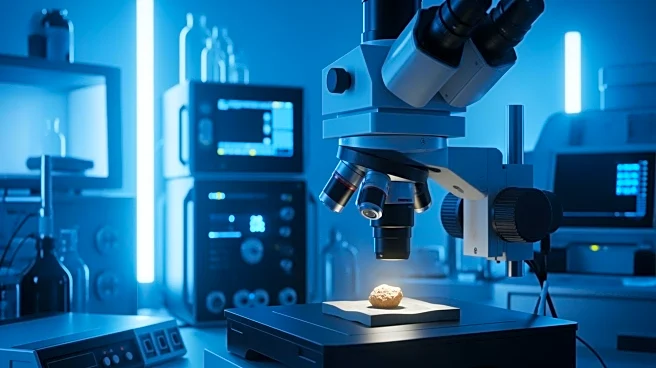What's Happening?
A recent study has demonstrated the potential to extract fragmented DNA from Martian surface rocks using nanopore sequencing technology. This method allows for the direct quantification of nucleobases and characterization of DNA fragments without amplification.
The study highlights the feasibility of using this approach for biosignature detection in future Mars missions, such as NASA/ESA's Mars Sample Return and China's Tianwen-3. The research underscores the challenges posed by Martian conditions, such as radiation and perchlorate salts, which can degrade DNA. Despite these challenges, the study shows that DNA fragments can still provide valuable insights into the microbiomes of rocks, suggesting that organic-carbon-rich sites on Mars are prime candidates for life detection.
Why It's Important?
The ability to extract and analyze DNA from Martian rocks could revolutionize the search for life beyond Earth. This method offers a sensitive and contamination-controlled approach to detecting biosignatures, which is crucial for astrobiology. The findings could inform the design of future Mars missions, enhancing our understanding of the planet's potential to harbor life. The study also emphasizes the importance of rigorous contamination control in planetary exploration, which is vital for ensuring the reliability of life detection experiments.
What's Next?
Future research will focus on optimizing DNA extraction methods for low-biomass environments and developing bioinformatics tools to distinguish indigenous microbial signals from contamination. As Mars missions progress, these techniques will be crucial for analyzing returned samples. The study suggests that Martian samples should be analyzed in high-containment facilities to prevent contamination and ensure accurate biosignature detection. Continued advancements in nanopore sequencing and contamination control will be essential for the success of these efforts.
Beyond the Headlines
This research highlights the broader implications of astrobiology in understanding life's potential beyond Earth. The study's findings could influence how we approach the search for life on other planets, emphasizing the need for interdisciplinary collaboration in space exploration. The challenges of DNA preservation and detection on Mars also raise questions about the limits of life in extreme environments, potentially informing our understanding of life's resilience and adaptability.














